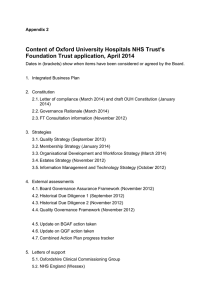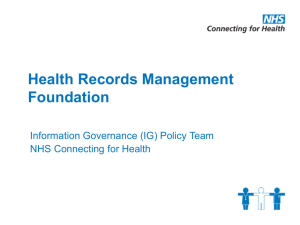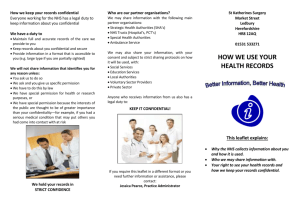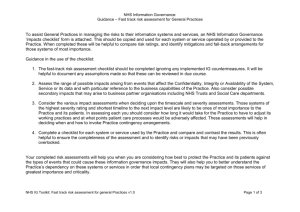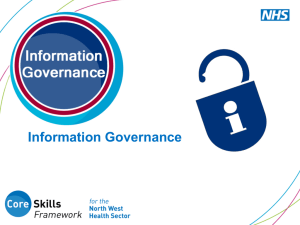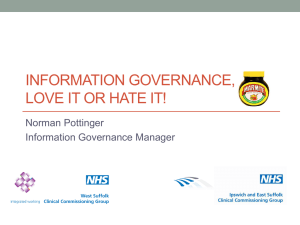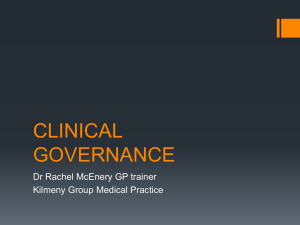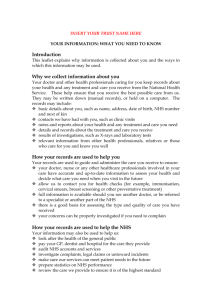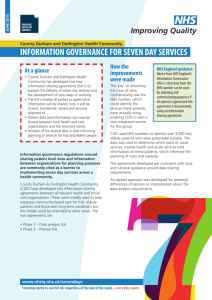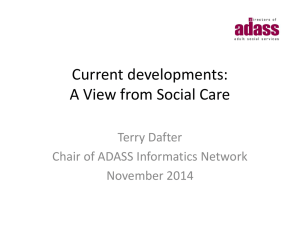Information Strategy - National Information Governance Board for
advertisement
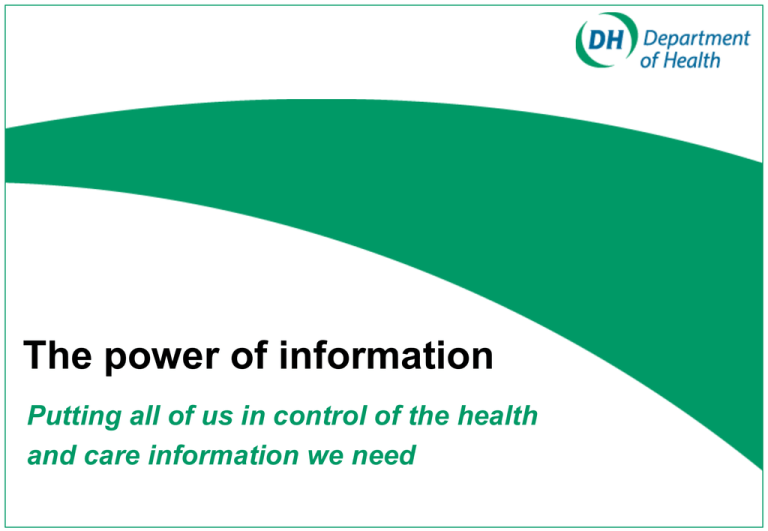
The power of information Putting all of us in control of the health and care information we need the vision: people first • Joined up systems and shared data standards will facilitate and drive integration within and between organisations and care settings to ensure that care is focused around the person and their health and care needs. This is why the strategy spans the NHS, public health and social care. • Getting the right information to the right people at the right time – in a form they can understand, engage with and contribute to – will help individuals take control of their own care, improving self-management, shared decision making, and more informed choices. • Needs support and advocacy to help people in all sectors of society to make meaningful use of it, harnessing modern technology where that is helpful. 2 the information strategy: main ambitions • Information used to drive integrated care across the entire health and social care sector • Information regarded as a health and care service in its own right – with appropriate support in using information available for those who need it, so that information benefits everyone and helps reduce inequalities • A change in culture and mindset, in which our health and care professionals, organisations and systems recognise that information in our own care records is fundamentally about us - so it becomes normal for us to access our own records • Information recorded once, at our first contact with professional staff, and shared securely between those providing our care – supported by consistent use of information standards that enable data to flow between systems whilst keeping our confidential information safe and secure the information strategy: main ambitions • Our electronic care records become the source for core information used to improve our care, improve services and to inform research, etc. – reducing bureaucratic data collections and enabling us to measure quality • A culture of transparency where access to high-quality, evidence-based information about services and the quality of care held by Government and health and care services is openly and easily available to us all • An information-led culture where all health and care professionals take responsibility for recording, sharing and using information to improve care • The widespread use of modern technology to make health and care services more convenient, accessible and efficient • An information system built on innovative and integrated solutions and local decision-making, within a framework of national standards that ensure information can move freely, safely, and securely around the system the vision: modern convenient information 1. Accessing your GP record online will give you more control over your care 4. You’ll have less paperwork in your life when your healthcare letters are available online 7. You won’t have to repeat yourself when your information is shared between health and care professionals 2. Booking appointments will be quicker when you can do it online 5. You’ll know where to go for health and care information when there is one trusted website 8. You’ll be confident that your feedback is being listened to and helping to improve services 3. You’ll need fewer phone calls when you can communicate with professional teams electronically 6. Services will do more to offer you support to use and understand information if and when you need it 9. You will have more information to help you choose the best services and treatments for you what we heard: information governance Consultation responses recognised: • the importance of providing safeguards to accessing data • barriers to sharing data get in the way of high quality care The NHS Future Forum received a clear message: • not sharing information has the potential to do more harm than sharing it 6 what we heard: information governance The NHS Future Forum also proposed a ‘deal’ along the lines of: • “You have a right to access your data and a right to withhold consent to its being shared. You have a corresponding responsibility to let us use your data in the interests of your own care and of improving the service for others.” • “We have a right to use your data, and a corresponding responsibility to tell you exactly what we plan to do with it and, when sharing it, to take all reasonable steps to protect your confidentiality.” 7 the vision: information governance Government has commissioned an independent review of information governance rules and their application, led by Dame Fiona Caldicott to ensure an appropriate balance between: • the protection of confidential and identifiable information within our health and care records and • the use and sharing of information to improve the quality and safety of our own care and for the benefit of wider society Government has also committed to consulting on an amendment to the NHS Constitution to make more explicit proposals for the ‘consent deal’ 8 the vision: care records - a core source of data the strategy online: aimed at real people • online version includes sections on “what the strategy means for me” using a wide range of case studies • easy-read developed in partnership with CHANGE, a learning disability organisation • equality impact assessment coproduced by the Department of Health with 13 other organisations • extensive partnership working with Intellect, Royal College of GPs and many others http://informationstrategy.dh.gov.uk
